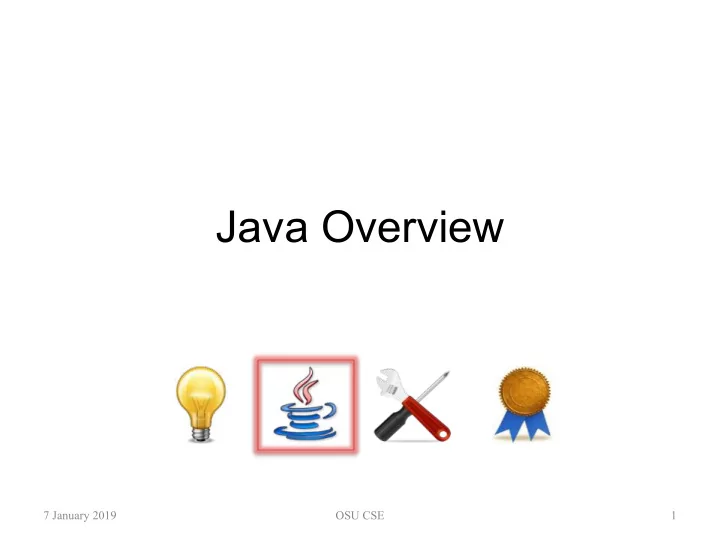

Java Overview 7 January 2019 OSU CSE 1
What is Java? • Programming language developed in early 1990s by Sun Microsystems (now part of Oracle) • Based on C/C++ – Similar syntax, control, data structures – Imperative, object-oriented • Originally designed for interactive television, found its initial success in Internet applications – Now viewed as a general-purpose programming language • Currently enjoys widespread acceptance 7 January 2019 OSU CSE 2
Java: Compilation • The Java compiler checks the source code of a program in a .java file; if and only if there are no compile-time errors, it generates bytecode for that program and saves it in a .class file – Eclipse has its own Java compiler that continually and incrementally compiles source code even as it is being edited; a compile-time error is seen immediately and bytecode is available immediately if no errors – A batch-style compiler called javac is part of the Java Development Kit (JDK) 7 January 2019 OSU CSE 3
Java: Execution • The Java Virtual Machine is a virtual computer – The JVM is just like any other program that runs on real physical hardware (e.g., an Intel chip) and operating system (e.g., Linux, Mac OS X, Windows) – The “launcher” of the JVM for your computer and OS loads the JVM and your program’s .class file(s), and the JVM then executes your program by interpreting the bytecode that is loaded – A launcher called java and the JVM are part of the Java Runtime Environment (JRE) for your computer and OS 7 January 2019 OSU CSE 4
Java End-to-End Java source code MyProg.java (a text file) 7 January 2019 OSU CSE 5
Java End-to-End Java source code MyProg.java (a text file) Java compiler generates bytecode from (legal, though not necessarily “correct”) program source code. 7 January 2019 OSU CSE 6
Java End-to-End Java source code MyProg.java (a text file) Java bytecode MyProg.class (a “binary” file) 7 January 2019 OSU CSE 7
Java End-to-End Java source code MyProg.java (a text file) Java bytecode MyProg.class (a “binary” file) Launcher loads JVM and your bytecode, which JVM executes by interpreting it. 7 January 2019 OSU CSE 8
Java End-to-End Java source code MyProg.java (a text file) Java bytecode MyProg.class (a “binary” file) JVM hardware/OS 7 January 2019 OSU CSE 9
Java End-to-End Java source code MyProg.java (a text file) Java bytecode MyProg.class (a “binary” file) Same bytecode can be JVM run on other hardware/OS with its hardware/OS own JVM. 7 January 2019 OSU CSE 10
Significance of JVM • Portability – Java slogan: “ Write once, run anywhere ” – JVM is ubiquitous • Universality – Program source code need not be in Java • Performance – Extra layer comes at (surprisingly small) penalty in performance 7 January 2019 OSU CSE 11
Recommend
More recommend